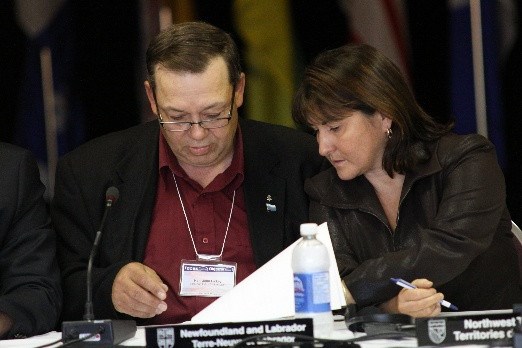When eight northern ministers put their heads together they found that most of the issues that plagued their communities shared a common theme.
More than 70 people participated at the 10th annual Northern Development Ministers’ forum. The forum, which wrapped up on Wednesday, featured eight northern ministers from all across the country from Nunavut to Newfoundland. The annual meeting started in Newfoundland and aimed to discuss universal issues, such as global warming, and discuss solutions to those problems.
The theme of the meeting was ceasing the future. Ministers were able to speak one-on-one with John Duncan, federal minister of Indian and Northern Affairs, and discuss issues that faced their regions.
MPP Michael Gravelle (Lb. Thunder Bay – Superior North) said that the forum helped to develop and focus the "rolling" action plan for the north. Gravelle said the discussions focused on issues that affected all the provinces and didn’t discuss anything too specific to Ontario.
Climate change became a hot topic to the politicians especially winter roads. Earlier this year, the warmer March weather lead to the early closure of ice roads in the far north, causing fuel supply issues for more than 30 remote communities.
Gravelle said it was interesting to compare the issues in Canada to the same problem faced in Nunavut.
"We’re now speaking about the all weather road system," Gravelle said. "We (the province) share the cost of the winter roads with the federal government and I certainly see an opportunity to have a further discussion with federal minister Duncan about the need to install an all weather road system."
Despite no action taking place immediately, Gravelle said the forum creates ongoing discussions.
Patty Pottle, minister of Aboriginal Affairs for Newfoundland and Labrador, said in Newfoundland and Labrador the Aboriginal communities faced lack of housing and overcrowding. However, that wasn’t the only issues addressed. A lack of community freezers for preserving meat also need to be addressed in her province.
"You get some great ideas and suggestions and you get to share ideas and suggestions," Pottle said. "There are no community freezers in my community but there is talk of wanting to do it. Just in a side conversation with ministers from the Northwest Territories who have those freezers, they stepped away from that idea and provided chest freezers to homeowners. There were some issues but now I can take that idea back to Labrador and maybe provide chest freezers instead."
The freezers would primarily help seniors and single families who are financially struggling, she said.
While the forum started in Labrador, it was Pottle’s second time attending the annual forum. She said it is a great opportunity for ministers to get together. Traditionally, there are a larger concentration of Aboriginals in northern communities facing issues that people in southern areas of the provinces can’t understand, she said.
"Half of my province is considered north and the other half is south," she said. "Even in my own province of Newfoundland we face that issue in regards to living in the south or living in the north."
Another discussion that repeatedly came up was Aboriginal industry. Ministers received presentations on ways to encourage First Nations businesses to open and get more education.
While the ministers wanted more discussion with the federal government to take place, MP Greg Rickford (Con. Kenora) said the Tory government is already developing strategies to try and develop northern infrastructure in the arctic region.
"The federal government is advancing a northern strategy that has at every step tried to contemplate the jurisdictional issues," Rickford said. "Our interests of course are an arctic sovereignty, protecting the north’s environment and certainly improving and further developing (Aboriginal business)."
Rickford said these goals are accomplished through forums like such as the one held in Thunder Bay and ensures that dialogue happens between all levels of government.
"We’re dealing with territories that are much larger than some continents. Our challenges are to bring that together," he said.
